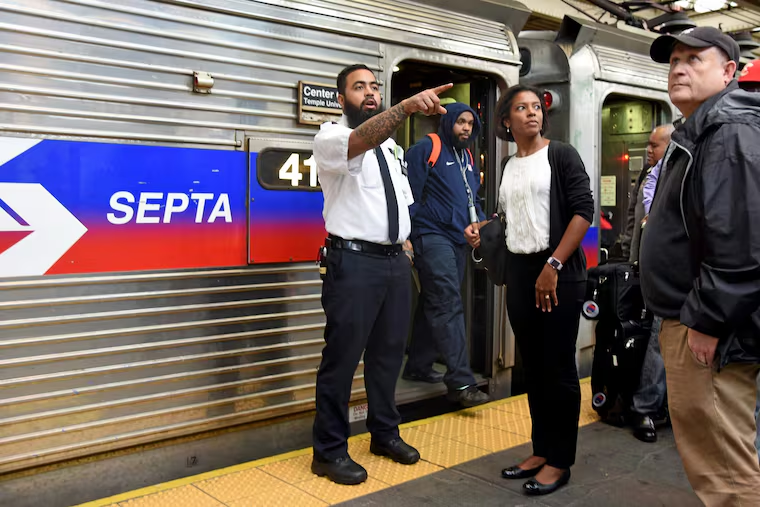Two more SEPTA unions will vote on a strike as labor talks intensify
Regional Rail engineers and conductors say low wages are contributing to employee shortages. SEPTA is in an intensive round of talks with TWU Local 234, which represents transit operators.

» READ MORE: Update: SEPTA strike averted for bus, trolley and subway workers
Unions representing both Regional Rail locomotive engineers and conductors said Monday that they are holding strike votes after months of mediated talks with SEPTA have failed to produce progress toward agreements.
The national presidents of the Brotherhood of Locomotive Engineers and Trainmen (BLET) and the SMART-Transportation Division, which represents the conductors, authorized the votes together, sending a message of solidarity as negotiations heat up with several of the transportation authority’s unions.
“We continue to try to get SEPTA to negotiate, but they’re not really working with us at all,” Eddie Hall, national president of the BLET, said in an interview. “I expect our membership will be behind this.”
The unions said they would jointly announce the results of the balloting on Nov. 20, in part because BLET’s bylaws require voting to be conducted by mail.
The announcement of strike votes came as negotiators for SEPTA and its largest bargaining unit, Transport Workers Local 234, hunkered down at a Center City hotel for marathon talks ahead of the Oct. 31 expiration of the two-year contract covering bus, trolley, and transit train operators, mechanics, and cashiers.
“I think the momentum will shift since we’re here,” said Brian Pollitt, president of TWU Local 234, speaking outside the Wyndham Philadelphia Historic District on Monday. He said the union’s negotiators intend to “lock ourselves” there for the week, meeting 24 hours a day if necessary.
Don Hill, the general chairman of Division 71 of the BLET, which represents Regional Rail engineers, was there lending support to Pollitt and the TWU as the engineers and conductors were announcing their strike votes.
“We started collaborating a lot more [with the other SEPTA unions] over the last 10 years,” Hill said in an interview. “We all realized it’s better to work together than be picked apart.”
Low wages, no raises
Engineers and conductors have not received raises in about four years, and their hourly wages already are the lowest among commuter rail systems nationally, union officials say. Engineers and conductors have been leaving to take better-paying jobs with other rail systems in the region — Hall, of the BLET, said there are 159 locomotive engineers on staff, compared to an authorized strength of 230.
“SEPTA owes us, and we’re coming to collect,” said Ray Boyer, general chairman of SMART-TD Local 61, representing about 481 conductors and assistant conductors. The local has been in talks with the agency for 18 months, also working with a federal mediator, with no result, Boyer said.
The full name of Local 61′s parent union is the International Association of Sheet Metal, Air, Rail and Transportation Workers, Transportation Division.
Boyer noted that SEPTA CEO Leslie S. Richards got a $75,000 raise in May to $425,000 while the agency is telling his members that they can’t afford to give them raises. Richards’ raise has also angered many TWU members.
“We’re working through the federal process and hoping an agreement can be reached soon,” said SEPTA spokesperson Andrew Busch.
Presidential approval
Contracts have ended for both BLET and SMART-Transportation Division, but the federal Railway Labor Act requires railroad employees to keep working on an automatic contract extension and begin talks with a mediator on a new one. Binding arbitration and a cooling-off period follow.
If the sides still can’t agree, the dispute can ultimately be decided by an emergency board appointed by President Joe Biden — as happened with a dispute between freight railroads and unions last year.
Indeed, both unions say that SEPTA has benefited by relying on Presidential Emergency Boards and convincing them not to require the agency to grant wage increases during the bargaining period and to eliminate retroactive wages.
As a result, passenger rail wages at SEPTA “have deteriorated,” said SMART’s Transportation Division Vice President Jamie Modesitt. “It is obvious to me that SEPTA hopes to repeat its attack on wages because they have made it clear to us that the Presidential Emergency Board is their goal.”
The approach to negotiations with Regional Rail employees is damaging to SEPTA and the public, in addition to union workers, said Hall, president of the national locomotive engineers, which is a division of the Teamsters.
“They don’t have enough staff to run their trains … [and] they’re having to cancel service to the public,” Hall said. “It’s because they refuse to bring engineers up to what they should be making.”